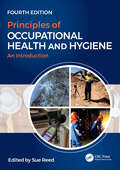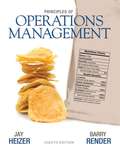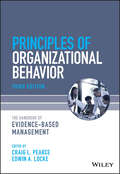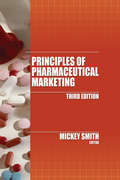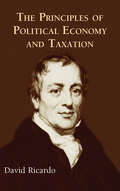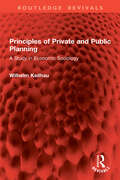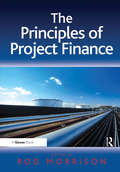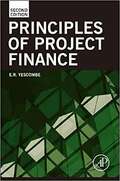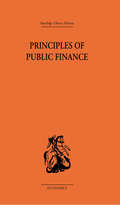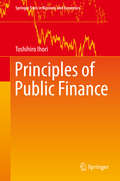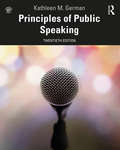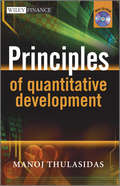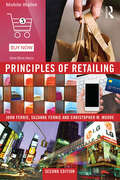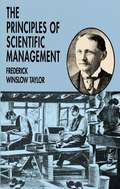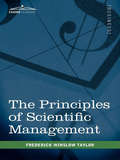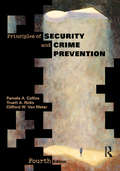- Table View
- List View
Principles of Microeconomics Version 2.0
by Libby Rittenberg Timothy TregarthenFlat World Knowledge is honored to publish Version 2.0 (an orginal re-launch) of Tim Tregarthen's wonderful principles of microeconomics book, and proud to bring Tim's incredible talents as a teacher back to life so future generations of students can continue to learn from him.
Principles of Occupational Health and Hygiene: An Introduction, Fourth Edition
by Sue ReedNow in its fourth edition, this book allows for early career occupational hygienists and occupational health and safety professionals or students to develop their basic skills and knowledge to anticipate, recognize, evaluate, and control workplace hazards that can result in injury, illness, impairment, or affect the well-being of workers and members of the community. Principles of Occupational Health and Hygiene: An Introduction, Fourth Edition offers a comprehensive overview of occupational health risks and hazardous environments encountered in a range of industries and organizational settings.This new edition offers information on the current techniques and equipment used in assessing workplace hazards. Methods of assessment are developing at a rapid rate due to the new technologies now available. Featuring new chapters on occupational hygiene statistics and psychosocial hazards and fully updated throughout, leading industry professionals and educators explain how to identify key workplace hazards including chemical agents such as dusts, metals and gases; physical agents such as noise, radiation and extremes of heat and cold; and microbiological agents. The book highlights assessment procedures and processes for identifying exposure levels and explains how to evaluate risk and follow safety guidelines to control and manage these hazards effectively. Highly illustrated, up to date with current Workplace Health and Safety legislation and written in a jargon-free manner, this book will be a bible to any student or professional.Principles of Occupational Health and Hygiene: An Introduction, Fourth Edition is an essential reference for students, early career Occupational Hygienists professionals and anyone in an Occupational Health and Safety role.
Principles of Operations Management (Eighth Edition)
by Jay Heizer Barry RenderThis book presents a state-of-the- art view of the activities of the operations function. This book will also help you understand how OM affects society and your life.
Principles of Organizational Behavior: The Handbook of Evidence-Based Management
by Craig L. Pearce Edwin A. LockeExplore invaluable management advice informed by the latest in organizational and industrial behaviour research In the newly revised Third Edition of Handbook of Principles of Organizational Behavior: Indispensable Knowledge for Evidence-Based Management, world-renowned organizational behaviourists Edwin A. Locke and Craig L. Pearce deliver a comprehensive and authoritative discussion of sound management practices informed by the most recent evidence and research in organizational and industrial psychology. In the book, the authors present: Complimentary and downloadable video material linked to each chapter Executive interviews and author interviews, new cases, assessments, inventories and exercises Updated chapters written by world-leading experts on the covered topicsAn indispensable resource for students of human resources, organizational behaviour, industrial psychology, public administration and related subjects, Handbook of Principles of Organizational Behavior will assist students and professionals seeking the latest evidence-based management guidance.
Principles of Pharmaceutical Marketing
by Mickey C. Smith Ph.D.Principles of Pharmaceutical Marketing, Third Edition offers the perspectives of both those who teach and those who practice pharmaceutical marketing. This reflects the need for and the effort to provide the most relevant “real world” approach to this complex and fascinating field. This text is designed for undergraduate students in pharmacy whose background in marketing is limited, those actually involved in pharmaceutical marketing, and anyone desiring an introduction to the intricacies involved in the marketing of pharmaceutical products.
Principles of Political Economy
by Wilhelm RoscherWilhelm Georg Friedrich Roscher was a German economist from Hanover. He studied at Göttingen, where he became a member of Corps Hannovera, and Berlin, and obtained a professorship at Göttingen in 1844, and subsequently at Leipzig in 1848. The main origins of the historical school of political economy may be traced to Roscher. Roscher tried to establish the laws of economic development by using the historical method from investigation of histories legal, political, cultural and other aspects, and developed a cyclical theory where nations and their economies pass though youth, manhood, and senile decay.
The Principles of Political Economy and Taxation
by David RicardoThis landmark treatise of 1817 formulated the guiding principles behind the market economy. Author Ricardo, with Adam Smith, founded the classical system of political economy, a school of thought that dominated economic policies throughout the 19th century and figured prominently in the theories of John Stuart Mill and Karl Marx.
Principles of Political Economy and Taxation [1911 Edition]
by David RicardoThis landmark treatise formulated the guiding principles behind the market economy. Author Ricardo, with Adam Smith, founded the classical system of political economy, a school of thought that dominated economic policies throughout the 19th century and figured prominently in the theories of John Stuart Mill and Karl Marx.-Print ed.
Principles of Pricing
by Robert J. Dolan John T. GourvillePresents the basic principles of pricing, including value pricing, price sensitivity, and price customization/discrimination.
Principles of Private and Public Planning: A Study in Economic Sociology (Routledge Revivals)
by Wilhelm KeilhauPrinciples of Private and Public Planning (1951) looks at a key economic question: plan or no plan? By examining the economic theories of both planned and unplanned economies together with human and societal impulses, it aims to provide both an analysis and overview of the topic.
Principles of Product Policy
by Anita ElberseProvides an introduction to key product policy issues.
Principles of Project and Infrastructure Finance
by Willie TanCurrent books on project finance tend to be non-technical and are either procedural or rely heavily on case studies. In contrast, this textbook provides a more analytical perspective, without a loss of pragmatism. Principles of Project and Infrastructure Finance is written for senior undergraduates, graduate students and practitioners who wish to know how major projects, such as residential and infrastructural developments, are financed. The approach is intuitive, yet rigorous, making the book highly readable. Case studies are used to illustrate integration as well as to underscore the pragmatic slant.
The Principles of Project Finance
by Rod MorrisonThe Principles of Project Finance reviews the technique of project finance. It explores, step-by-step, the key ingredients of the concept. The book is aimed at a business savvy audience, but one which is not necessarily up to speed on the concept, and has a global reach by covering both OECD countries and the emerging markets. Project finance is positioned at a key point between the global capital markets and the energy and infrastructure industries. To explain and illustrate the ideas behind project finance, the book is made of chapters written by a range of leading players in the market from around the world and is split into four sections: ¢ The first reviews various themes and issues key to the project finance market - views from bankers, lawyers and advisers plus chapters on bank, bond and multilateral finance and a look at environmental, insurance and construction market issues. ¢ The second section looks at how project finance is used in various sectors of the energy and infrastructure market - renewable energy, oil and gas, mining, PPPs and roads and transportation. ¢The third then takes an in-depth look at various projects finance markets from around the world - Australia, Vietnam, Indonesia, India, Turkey, Russia, Africa, France, USA and Brazil. ¢ Finally, the fourth section presents a series of Top 10 deal cases studies from the pages of Thomson Reuters Project Finance International (PFI), the leading source of global project finance information.
Principles of Project Finance
by E. R. YescombeThe Second Edition of this best selling introduction for practitioners uses new material and updates to describe the changing environment for project finance. Integrating recent developments in credit markets with revised insights into making project finance deals, the second edition offers a balanced view of project financing by combining legal, contractual, scheduling, and other subjects. Its emphasis on concepts and techniques makes it critical for those who want to succeed in financing large projects. With extensive cross references and a comprehensive glossary, the Second Edition presents anew a guide to the principles and practical issues that can commonly cause difficulties in commercial and financial negotiations. <p><p> <ul> <li>Provides a basic introduction to project finance and its relationship with other financing techniques</li> <li>Describes and explains: sources of project finance; typical commercial contracts (e.g., for construction of the project and sale of its product or services) and their effects on project finance structures; project finance risk assessment from the points of view of lenders, investors, and other project parties; how lenders and investors evaluate the risks and returns on a project; the rôle of the public sector in public private partnerships and other privately financed infrastructure projects; how all these issues are dealt with in the financing agreements</li> </ul>
Principles of Public Finance (Routledge Library Editions)
by Hugh Dalton'Dalton has succeeded in expressing general economic concepts in simple language' The Economist. The 1971 edition of this famous textbook includes recent material to the general survey on the theory of taxation, other forms of public revenue, public expenditure and public debts. There are chapters on modern theories of budgetary policy and the controversial cheap money policy, pursued by the author when he was in charge of the British Treasury from 1945-1947.
Principles of Public Finance
by Toshihiro IhoriThis textbook equips instructors and students with an overview of the existing literature so that the latter can attain an overall understanding of macroeconomic and microeconomic public finance. The literature on public finance has grown dramatically with theoretical studies and empirical analysis, and much of the focus has been on macroeconomic effects of public services. The standard textbook offerings, however, are mainly restricted to microeconomic topics of public finance. This text intends to fill this gap by presenting a theoretical-based, comprehensive explanation of public finance. Particular emphasis is directed at developing tools that can be applied theoretically and empirically to clarify essential economic concerns in the current public sector in advanced countries, including Japan. Such concerns include the macroeconomic effect of fiscal policy, the dependence on bonds for covering government deficits, and social security reform. The main text explains the standard concepts of public finance, and the appendix offers various advanced topics. The material will facilitate an understanding of how to investigate changes in the public sector, interpret results, and basically do research on fiscal policy. The textbook will be of value to a broad range of course offerings, including those generally focused on fiscal policy, on social security reform and on tax reform.
Principles of Public Speaking
by Kathleen GermanBalancing skills and theory, this introductory public speaking textbook encourages the reader to see public speaking as a way to build community in today’s diverse world. Within a framework that emphasizes speaker responsibility, listening, and cultural awareness, this classic book uses examples from college, workplace, political, and social communication to make the study of public speaking relevant, contemporary, and exciting. This new edition includes expanded coverage of mediated speaking with examples from podcasts and online speaking contexts; discussion of ethical issues of contemporary public discourse, including disinformation and public civility; and tips for extemporaneous speaking. This textbook is ideal for general courses on public speaking as well as specialized programs in business, management, political communication, and public affairs. A companion website including an instructor’s manual containing discussion questions, exercises, quiz questions, and suggestions for syllabus design is available at www.routledge.com/cw/german.
Principles of Quantitative Development
by Manoj ThulasidasPrinciples of Quantitative Development is a practical guide to designing, building and deploying a trading platform. It is also a lucid and succinct exposé on the trade life cycle and the business groups involved in managing it, bringing together the big picture of how a trade flows through the systems, and the role of a quantitative professional in the organization.The book begins by looking at the need and demand for in-house trading platforms, addressing the current trends in the industry. It then looks at the trade life cycle and its participants, from beginning to end, and then the functions within the front, middle and back office, giving the reader a full understanding and appreciation of the perspectives and needs of each function. The book then moves on to platform design, addressing all the fundamentals of platform design, system architecture, programming languages and choices. Finally, the book focuses on some of the more technical aspects of platform design and looks at traditional and new languages and approaches used in modern quantitative development.The book is accompanied by a CD-ROM, featuring a fully working option pricing tool with source code and project building instructions, illustrating the design principles discussed, and enabling the reader to develop a mini-trading platform.The book is also accompanied by a website http://pqd.thulasidas.com that contains updates and companion materials.
Principles of Radical Decentralization: Moving Beyond Budgeting
by Jeremy Hope Robin FraserIt is not difficult to see why the budgeting process is such a barrier to effective empowerment. It restricts decision making to specified plans and budgets, and it assumes the absence of trust. This chapter outlines some common principles that leaders have used to remove these barriers to empowerment and transform their organizations.
Principles Of Responsible Management: Glocal Sustainability, Responsibility, And Ethics
by Roger Conaway Oliver LaaschPRINCIPLES OF RESPONSIBLE MANAGEMENT offers an international, scientifically sound, and strictly practice-related perspective. It is the first official textbook of the United Nations for the Principles for Responsible Management Education (PRME) academic network, and a reference book for companies of the United Nations Global Compact Initiative. It is a primary text for traditional business and society, business ethics, corporate social responsibility, and sustainability courses, or may serve as a practitioner handbook. Contributors are renowned academic professionals in their respective chapter topics as well as distinguished business practitioners who contribute highly relevant practice cases.
Principles of Retailing
by John Fernie Suzanne Fernie Christopher MooreRetailing is one of the biggest and most important sectors in today's economy. Graduates who are seeking a career in the sector will therefore require a solid knowledge of its core principles. The Principles of Retailing Second Edition is a topical, engaging and authoritative update of a hugely successful textbook by three leading experts in retail management designed to be a digestible introduction to retailing for management and marketing students. The previous edition was praised for the quality of its coverage, the clarity of its style and the strength of its sections on operation and supply chain issues such as buying and logistics, which are often neglected by other texts. This new edition has been comprehensively reworked in response to the rapid changes to the industry, including the growth of online retail and the subsequent decline of physical retail space and new technologies that improve customer experience and help track consumer behaviour. It also builds upon the authors' research over the last decade with new chapters on offshore sourcing and CSR and product management in addition to considerable revisions to existing chapters to highlight changes in online retailing and e-tail logistics, retail branding, retail security, internationalisation and the fashion supply chain. This edition will also be supported by a collection of online teaching materials to help tutors spend less time preparing and more time teaching.
The Principles of Scientific Management
by Frederick Winslow TaylorThe basis of modern organization and decision theory, this influential essay has motivated administrators and students of managerial technique for more than 80 years. The author discusses eliminating inefficiency through a system based on principles applicable to individual and collective activities. A ground-breaking, and still-inspiring work.
The Principles of Scientific Management
by Frederick Winslow TaylorIt seems, at first glance, like an obvious step to take to improve industrial productivity: one should simply watch workers at work in order to learn how they actually do their jobs. But American engineer FREDERICK WINSLOW TAYLOR (1856-1915) broke new ground with this 1919 essay, in which he applied the rigors of scientific observation to such labor as shoveling and bricklayer in order to streamline their work... and bring a sense of logic and practicality to the management of that work. This highly influential book, must-reading for anyone seeking to understand modern management practices, puts lie to such misconceptions that making industrial processes more efficient increases unemployment and that shorter workdays decrease productivity. And it laid the foundations for the discipline of management to be studied, taught, and applied with methodical precision.
The Principles of Scientific Management
by Frederick Winslow TaylorFor more than 80 years, this influential work by Frederick Winslow Taylor -- the pioneer of scientific management studies -- has inspired administrators and students of managerial techniques to adopt productivity-increasing procedures. Indeed, this book laid the groundwork for modern organization and decision theory.As an engineer for a steel company, Taylor made careful experiments to determine the best way of performing each operation and the amount of time it required, analyzing the materials, tools, and work sequence, and establishing a clear division of labor between management and workers. His experiments resulted in the formulation of the principles expounded in this remarkable essay, first published in 1911.Taylor advocated a scientific management system that develops leaders by organizing workers for efficient cooperation, rather than curtailing inefficiency by searching for exceptional leaders someone else has trained. The whole system rests upon a foundation of clearly defined laws and rules. Moreover, the fundamental principles of scientific management apply to all kinds of human activities, from the simplest individual acts to the most elaborate cooperative efforts of mighty corporations. Correct application of these principles, according to Taylor, will yield truly astonishing results.
Principles of Security and Crime Prevention
by Clifford W. Van Meter Truett A. Ricks Pamela A. CollinsThis introductory text provides a thorough overview of the private security system. This edition includes crime prevention and its zones of protection - the theoretical framework that provides the bridge between private and public sector law enforcement. From the historical development and the professional nature of security and crime prevention to the legal aspects of private security, this well-rounded text covers basic elements of security and crime prevention.

